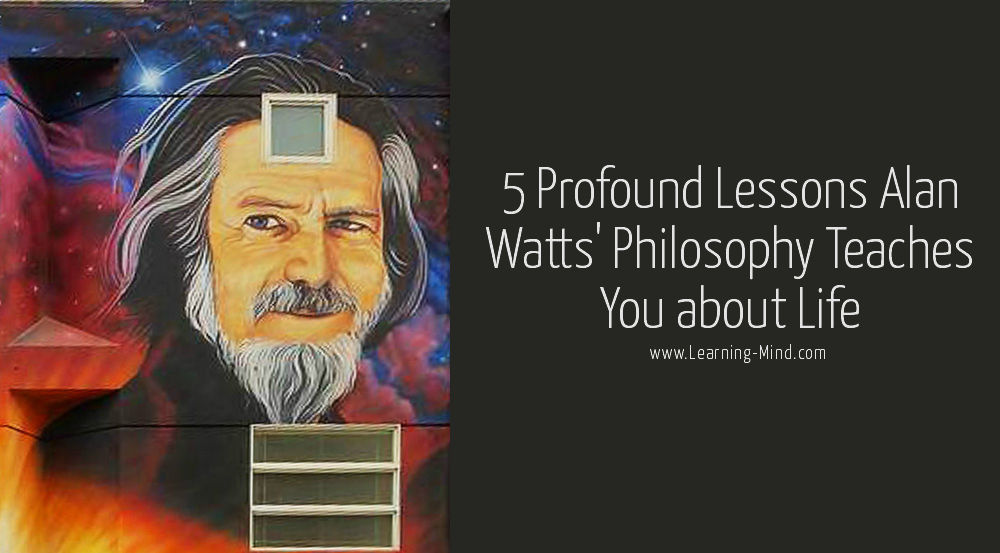
Alan Watts was a 20th Century British philosopher known for popularising the Zen and Buddhist teachings in Western Society, moving them from a religion to a way of life.
Writing over 25 books and holding over 400 lectures, Watts became one of the most popular philosophers of his time. He created a surge in the popularity of mindfulness and public ethics. Alan Watts’ philosophy holds some valuable life lessons that will give you a new perspective on existence.
These five quotes from Alan Watts’ philosophy will help you reframe your thinking and make the most out of life.
It’s surprising how many people go through life not really knowing what they want to do with it. Going to college undecided, constantly changing careers or switching from one hobby to another are all signs that you don’t know who you really are; and that’s okay. It’s easy to be distracted by what’s expected of you.
Watts explains that it is so easy to simply conform to societal ideals of what we need to do. While this is okay, we need to be the God of our own lives. Find out who we are, what it is that we want to do and go after it.
We are constantly judging ourselves and others on looks, performance, and how well we manage situations. We spend so much time making comparisons and judgements that we forget to stop and appreciate what is around us.
When we look up to the stars, we appreciate their beauty rather than scrutinising how they look or how well they perform as stars. This is something Watts believes we should take into our everyday lives. Things are the way they are and we can’t control every aspect of life.
Everyone plans for the future and holds onto the past, but these concepts are simply abstract imaginations that exist in our present. We may know what’s coming, but we also know it’s not here right now.
Instead of focusing on what has been or what might be, we should appreciate that life is fleeting. Concentrate on the here and now; enjoy your present. At least then, in the future, you’ll be able to say that you enjoyed your past.
We all see imperfections when we look in the mirror or our own shortcomings in work. We can tend to focus on these more than the good parts of ourselves and it damages our self-esteem.
Watts teaches that we are seeing ourselves in the wrong way. We are all naturally incredible beings. We exist in nature in the same way that trees, clouds and water does and this is something to celebrate. There is nothing wrong with who you are, so focus on what makes you, you.
Uncertainty is scary, so we try to minimise the areas we feel uncertain about. We constantly feel the need to regulate aspects of the world around us. We seek security in a world where spontaneity rules. Watts teaches that the more we try to do this, the more lifeless it becomes. Essentially, controlling everything takes the fun out of life.
Life, beings, and nature are constantly changing. Plants grow, weather changes and life is out of our control. Take a moment to stop and enjoy the uncertainty. It can be fun to not know what the outcome is going to be. Learn to move with the ebb and flow of the world and appreciate the parts of life which you can’t control.
If you read Alan Watts’ philosophy, you will find that it has a profound way of sticking with you throughout life. His work will open your mind to new ideas and reframe your thinking to get the most enjoyment out of the day-to-day reality.
If these life lessons have interested you in Alan Watts’ philosophy and teachings, I thoroughly recommend you peruse his work yourself. There is plenty to explore and his work is accessible to everyone.
References:
View Comments
Alan Watts knew that a living being is just that and nothing more so he decided not to live as a human any more so the only way to be who is ,,,is to leave this world life the only way he could ,,, not that i think it was the best way to finish the physical self there re ways but thats for the individual to work out themselves
i did comment to repeat what i have said in a few shorter words Alan Watts finalised his life the only he knew at 58 years their was nothing more he could talk about ,, so he ended his physical human existence to experience the only real existence of consciousness which is out of the human physical body,,,
Great and informative. Thank you...